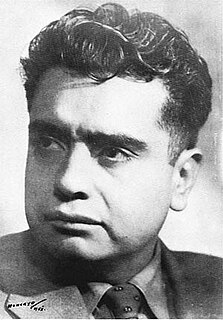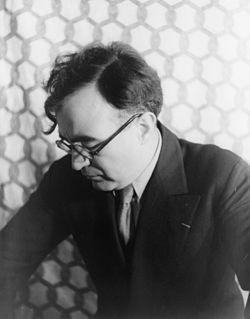Related Research Articles

Silvestre Revueltas Sánchez was a Mexican composer of classical music, a violinist and a conductor.

José Pablo Moncayo García was a Mexican pianist, percussionist, music teacher, composer and conductor. "As composer, José Pablo Moncayo represents one of the most important legacies of the Mexican nationalism in art music, after Silvestre Revueltas and Carlos Chávez." He produced some of the masterworks that best symbolize the essence of the national aspirations and contradictions of Mexico in the 20th century.
Esteban Benzecry is an Argentine classical composer.
The National Symphony Orchestra of Colombia is a Colombian orchestra based in Bogotá

The National Symphony Orchestra is the most important symphony orchestra in Mexico. With its origins traced back as 1881, along with the Boston Symphony Orchestra, it is the second-oldest symphony orchestra in the American continent. The orchestra does not have a permanent venue but performs regularly in the Grand Hall of the Palace of Fine Arts in Mexico City.

The Auditorio Nacional de Música is a complex of concert venues located in Madrid, Spain and the main concert hall in the Madrid metropolitan area. It comprises two main concert rooms: a symphonic hall and a chamber music hall.
Juan Trigos is a Mexican composer and conductor who created the "Hemofiction Opera" genre.
Ricardo Roberto Francia is an Argentinian musician, cellist, and music arranger, born on May 20, 1932 in Buenos Aires, Argentina.
Enrico Chapela is a Mexican contemporary classical composer, whose works have been played by multiple major orchestras and has been commissioned to compose for institutions such as the Los Angeles Philharmonic, the National Center for the Performing Arts (Beijing) and the Festival Internacional Cervantino. His work is influenced by modern popular musical styles such as rock and electronic, as well as Mexican popular culture.
Francisco Zumaqué Gómez is a Colombian musician and composer of rich Colombo-Caribbean rhythms. Defined as a contemporary musician with great part of his compositions oriented to Electroacoustic music, doing important research that contributed in the creation of new rhythms mixing traditional Colombian music with orchestral compositions. His music is considered avant-garde and refreshing, bright, flexible and with a personal worrisome of his cultural mark, all of these are reflected in several compositions that were a hit and are part of Colombian musical history. His compositions include symphonies, chamber music, vocals and works for non-conventional musical groups.
Flores Chaviano is an accomplished Cuban composer, guitarist, professor and orchestral conductor that has achieved great international recognition.
Maciej Żółtowski - alternative spelling: Zoltowski is a Polish conductor and composer. Maciej Żółtowski studied violin at the F. Chopin and J. Elsner Music Schools in Warsaw. Having earned his diploma in violin performance with distinction, he continued his studies at the F. Chopin Academy of Music in Warsaw, where he graduated in 1996 in composition and in 1997 in conducting faculty, obtaining both M.A. diplomas with awards. His teachers at the academy included Prof. Marian Borkowski and Prof. Ryszard Dudek.

Sinfonía india is Carlos Chávez's Symphony No. 2, composed in 1935–36. In a single movement, its sections nevertheless follow the traditional pattern for a three-movement symphony. The title signifies the fact that the thematic material consists of three melodies originating from native-American tribes of northern Mexico. The symphony is Chávez's most popular composition.

Janitzio is a symphonic poem by the Mexican composer Silvestre Revueltas, composed in 1933 and revised in 1936. A performance lasts about 15 minutes. The work is a portrait of Janitzio Island in Lake Pátzcuaro, Mexico.

Vicente Zarzo Pitarch was a Spanish horn player. He played as a soloist in several European and North American orchestras. He was also the author of several books on the history and technique of the horn.
Miguel Ángel Gilardi is an orchestra conductor. He is the son of the Argentinian composer Gilardo Gilardi and María Lucrecia Madariaga.

Miguel Salmon Del Real is a Mexican orchestra conductor, son of an industrial engineer and a psychologist who studied young piano and singing respectively.
Rafael Machado is a Cuban violinist.

Sergio Rosales is a Venezuelan conductor. He formed the El Sistema and is the music director of the Simon Bolivar Youth Symphonic Band.
References
- ↑ "Sergio Berlioz". www.casalamm.com.mx.
- ↑ "Miércoles Musicales". www.casalamm.com.mx.
- ↑ "Yahoo! Entretenimiento - Impartirá Sergio Berlioz conferencia sobre Félix Mendelssohn". Archived from the original on 2011-07-18. Retrieved 2010-03-29.
- ↑ "Entrevista con el compositor Sergio Berlioz", periodicodigital
- ↑ "Puebla rendirá homenaje a compositores mexicanos vivos con conciertos". Terra.
- ↑ "Conciertos en Puebla - Orquesta Sinfónica del Estado de Puebla | OSEP - 19 de abril 2012". www.pueblamusical.com.
- ↑ ""Sexta sinfonía" de Sergio Berlioz - Proceso". Proceso (in Mexican Spanish). 11 July 2016.
- ↑ Berlioz, Sergio (2002). Educar con música (First ed.). México: Aguilar. p. 149.
- ↑ "Educar con música - Proceso". Proceso (in Mexican Spanish). 1 December 2002.
- ↑ "RED-AM". redam.mx.